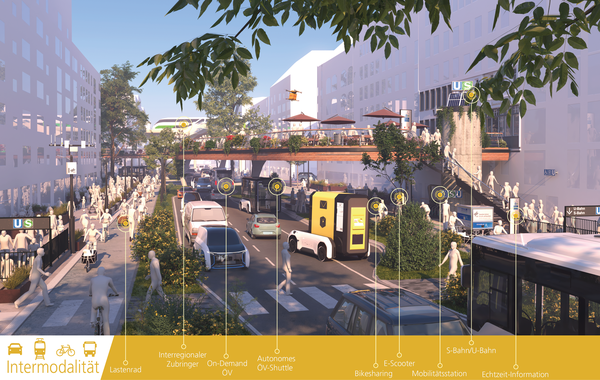Strategy 2030



Conducting cutting-edge research, strengthening core competencies, harnessing potential synergies and providing incentives for innovation – this is DLR’s increasingly strong response to the new challenges of the 21st century and the basis of its efforts to help solve them. The DLR Strategy 2030 charts the course for the future and is based on the following three guiding principles:
- Scientific excellence
- A focus on meeting societal challenges
- Partnership with industry
Solutions from one source
DLR has strong research capabilities and achieves synergies across different sectors thanks to its broad range of institutes and facilities, the depth of its expertise and the targeted combination of different competences within the organisation and in cooperation with external partners in industry and science.
DLR's traditional strength is its systems capability in aerospace research, which is unique in Europe and continues to evolve.
In energy and transport research, DLR is adopting a high level systems approach, working on topics that are vital to the energy transition and future transport policy.
DLR will continue to expand its cross-sectoral area of security research to be able to offer practical solutions to future threats. In order to address the current technological and social upheaval wrought by the digital transformation, DLR has also established the cross-sectoral area of Digitalisation.
Potential synergies arise where different research and cross-sectoral areas intersect. In the future, these synergies will be systematically identified and consistently brought to fruition.
Technology – Innovation – Transfer
To increase the potential for innovation and strengthen technology transfer, DLR will increase its investment in innovation projects in a targeted manner over the coming years across all sectors of industry. These projects will be carried out jointly with industry – in particular with small and medium-sized enterprises – and, where appropriate, with other research institutions.
In addition, DLR will increase its support for start-ups and expand the opportunities for DLR's entrepreneurial participation in its spin-offs. The organisation is expanding its cooperation with industry within the framework of new and existing strategic innovation partnerships.
Research policy framework conditions
DLR offers industry, society and policymakers its problem-solving expertise in response to upcoming challenges. In doing so, DLR is guided by the central strategic goals of the German Federal Government and the priorities of government research funding. In addition to its aerospace expertise, DLR offers its deep experience in energy and transport research to inform social debate and the political decision-making process.
The European Green Deal and associated European funding programmes such as Horizon Europe, the European Defence Fund and Digital Europe, as well as Europe’s new aeronautics vision 'Fly the Green Deal' from the European technology platform ACARE (Advisory Council for Aeronautics Research in Europe), all play an essential role for the future global competitiveness of Germany and Europe from an innovation policy perspective and thus represent key framework conditions for DLR's activities.
Another important framework condition is DLR’s membership of the Helmholtz Association and its participation in the programme-oriented funding process. With its interdependent research and development work in aeronautics, space, energy, transport, security and digitalisation, DLR also contributes towards the achievement of several of the United Nations Sustainable Development Goals (SDGs).






